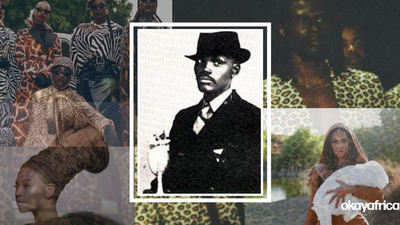How the Creator of ‘The Lion Sleeps Tonight’ Finally Got His Due In ‘Black Is King’
Thanks to Beyoncé, Solomon Linda's famous song finally made its Disney debut—81 years after it was written.
By now, we've all seen and heard think piece after think piece about Beyoncé's latest visual album release Black Is King.The film depicts and celebrates a great deal of African culture and history, paying homage to many underrated and misunderstood artists and practices.
One moment, however, put an end to an 81-year struggle with the Disney giants.
Perhaps one of Disney's most popular songs, "The Lion Sleeps Tonight," is a reproduced version of the late South African performer Solomon Ntsele (Linda)'s song "Mbube."
Linda, while working as a record packer at South African recording company Gallo Record Company, improvised "Mbube"during a recording session with company talent scout Griffith Motsieloa and his band the Evening Birds. The song went on to be successful in South Africa between 1939 and 1949, with Linda ultimately selling the rights to Gallo Record Company for what was equivalent to $2 (US) at the time.
However, according to British law, which ruled the land at the time, those rights should have been returned to his family in 1962, 25 years after his death.

In an article written for the Rolling Stones, South African journalist Rian Malan stated that the subsequent musical groups who covered, adapted and essentially stole the track were not aware of what they were doing. While their managers, and legal teams were well aware, as they had been contacted by the owner of Gallo Records at the time, Eric Gallo. The American teams claimed that South African copyright laws were not legally binding as the two countries had not come to sign a copyright agreement.
Malan's article, published in 2000, sparked outrage and support of Linda's descendants lawsuit against Disney in 2004. Two years later, Linda's family reached a monetary settlement which also made sure that Solomon would be credited as a co-writer.
This settlement, however, lasted until December 2017—two years before the live action remake of The Lion King hit screens. The Linda family was yet again missing out—until now.
In an interview with The Washington Post, Beyonce's mother Tina Knowles-Lawson revealed that Solomon's story was what inspired the film, "I remember having a conversation with her [...] about a Black man that penned one of the top songs in the movie, and that he was given money but not the credit for it. And it just really angered her." Knowles-Lawson went on to say, "I remember that day, leaving the studio, and her saying, 'I'm gonna create a film [...] and I'm gonna tell the real story of what happened."
By using the original track, Beyonce paid her respects to the late Linda, who died a poor man, while ensuring that his family received the monetary gain they have fought for for so long. The original song being played in a Disney film, must have been fulfilling in its own way too.
Some fans were quick to pick up on the acknowledgement and eagerly shared Netflix's 2019 documentary on Solomon titled The Lion's Share. The film depicts Linda's full story with contributions made by his family and former record label executives.
While the stories of Black and African artists being duped by larger names and bodies are far from over, it is worthwhile to note when others are given their flowers. Black is King has been praised for its emphasis on celebrating Black voices within Africa, while bringing more knowledge about the continent to the world. This is one example of where 'Black is King" excels in doing so.
- Where to See More From the Talent In Beyoncé's 'Black Is King' ›
- Beyoncé Releases Music Video for 'Already' Featuring Shatta Wale ... ›
- You Need To See the Trailer For Beyoncé's 'Black Is King' - OkayAfrica ›
- Beyoncé's New 'Lion King' Album Features Tiwa Savage, Mr Eazi ... ›
- ‘The Lion King’ Prequel Will be a Full Circle Moment for Lebo M - Okayplayer ›

